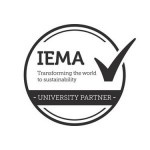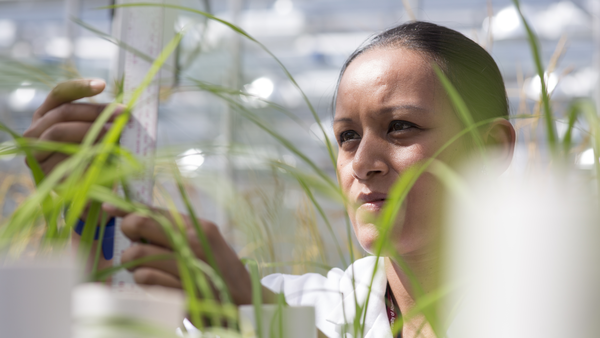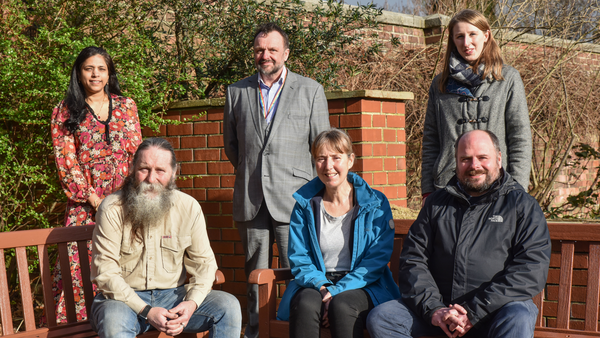
Introduction
This interdisciplinary programme promotes an understanding of key environmental issues within sustainability and environmental management. This degree will give you the knowledge and understanding of current environmental issues at the local, regional and global context and how to critically appraise them.
Study Information
At a Glance
- Learning Mode
- On Campus Learning
- Degree Qualification
- MSc
- Duration
- 12 months or 24 months
- Study Mode
- Full Time or Part Time
- Start Month
- September
- Location of Study
- Aberdeen
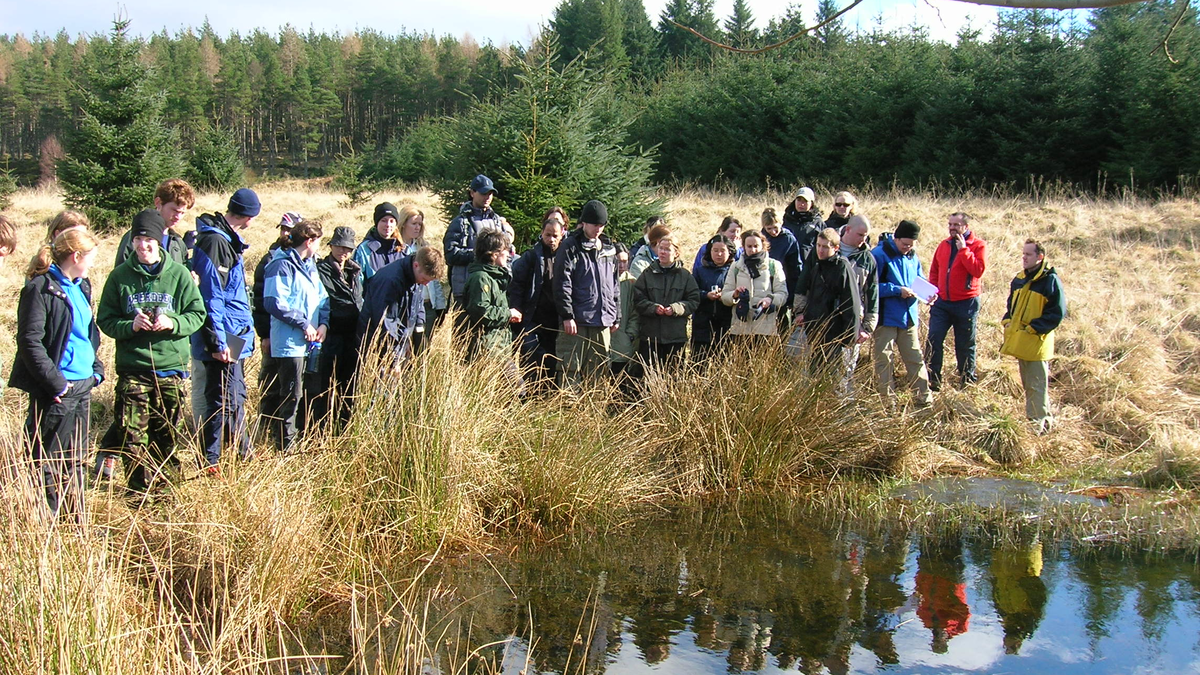
This MSc is ideally suited for students looking to gain a greater understanding of environmental science and environmental management. This degree aims to address environmental issues within the local, regional and global context.
Within the programme students will cover courses in environmental pollution, environmental management planning, catchment management and environmental impact assessment. During these courses they will develop key skills in environmental policy, legislation, risk assessment models and writing management plans. The students will gain a wide understanding of landscape science within a context that develops upon empirical details.
These skills will make the graduates ideal candidates for positions in environmental consultancies, regulators and NGOs.
What You'll Study
- Stage 1
-
Compulsory Courses
Stage 1 compulsory courses include:
- BI5013 - Ecological and Environmental Data Analysis Using R
- SS5005 - Global Soils and the Environment
- EV5319 - Tools for Land Management and Climate
- EK5314 - Ecology, Conservation and Society
- Getting Started at the University of Aberdeen (PD5006)
-
This course, which is prescribed for all taught postgraduate students, is studied entirely online, takes approximately 5-6 hours to complete and can be taken in one sitting, or spread across a number of weeks.
Topics include orientation overview, equality and diversity, health, safety and cyber security and how to make the most of your time at university in relation to careers and employability.
Successful completion of this course will be recorded on your Enhanced Transcript as ‘Achieved’.
- Stage 2
-
Compulsory Courses
Stage 2 compulsory courses include:
- EK5515 - Catchment Management
- Environmental Analysis (EV5800)
-
15 Credit Points
The mixture of applied science and theoretical work on this course places you in a valuable position for understanding the procedures and applications in modern environmental science.A number of laboratory classes allows you to familiarise yourself with the current analytical instrumentation in environmental science.The course uses examples of environmental issues allowing you to understand the problem, how the analysis was conducted and the implications of the results. The main assessment in this course is a practical write up that is written in the style of a scientific report giving you an opportunity to perfect this style of writing.
- Environmental Impact Assessment (EK5804)
-
15 Credit Points
The course provides background information about the origins and development of Environmental Impact Assessment (EIA) process, and its implementation in the UK and elsewhere. It also highlights the significance of impacts associated with selected developments addressed in detail in seminars. The lectures and seminars are supported by workshop sessions focusing on case studies and providing insights into the issues that arise during the EIA. The course also provides an opportunity to develop transferrable skills valued by employers, such as team-working, time-management, communication of science, and critical appraisal. Throughout the course you will work with genuine EIA materials utilised during different stages of the EIA process, to identify likely environmental effects, judge their significance, and propose how they should be assessed and mitigated.
- Applications of GIS (EV5517)
-
15 Credit Points
Lectures and structured workshops develop your knowledge of the principles and practice of geographic information systems, and familiarise you with ArcGIS software, enhancing your employability.
An individual investigation allows you to explore a specific application that you are interested in and demonstrate your proficiency with the software and your command of the conceptual underpinnings.
A flexible teaching and learning environment allows for individualised learning and enrichment for students with existing skills in GIS.
- Stage 3
-
Compulsory Courses
- Project in Environmental Management (EV5906)
-
60 Credit Points
The three-month individual Research Project can cover any area of environmental management and is undertaken under the supervision of a member of staff who is an expert in your chosen field. Many projects are also done in collaboration with an external organisation. The project provides opportunities for you to develop your abilities and skills, generate hypotheses and design ways of testing them and to analyse, report and discuss your findings. You will learn to take responsibility for implementing your own plans and modifying them as necessary. The project is written up in the style of a scientific paper manuscript or a consultancy report.
We will endeavour to make all course options available; however, these may be subject to timetabling and other constraints. Please see our InfoHub pages for further information.
Fee Information
| Fee category | Cost |
|---|---|
| EU / International students | £27,000 |
| Tuition Fees for 2024/25 Academic Year | |
| UK | £12,200 |
| Tuition Fees for 2024/25 Academic Year |
Additional Fee Information
- In exceptional circumstances there may be additional fees associated with specialist courses, for example field trips. Any additional fees for a course can be found in our Catalogue of Courses.
- For more information about tuition fees for this programme, including payment plans and our refund policy, please visit our InfoHub Tuition Fees page.
International Applicants
Further Information about tuition fees and the cost of living in Aberdeen
Funding Opportunities
Visit our Funding Database to find out more and see our full range of scholarships, including our Aberdeen Alumni Discount.
Scholarships
Self-funded international students enrolling on postgraduate taught (PGT) programmes will receive one of our Aberdeen Global Scholarships, ranging from £3000 to £8,500, depending on your domicile country. Learn more about the Aberdeen Global Scholarships here.
To see our full range of scholarships, visit our Funding Database.
How You'll Study
A wide range of teaching methods are used at Aberdeen to ensure that you are able to learn in a way that suits your learning style and enables you to achieve the best possible outcome. Our class sizes are small and we have a low student to tutor ratio, meaning you will have the full support of your group tutors.
Our great diversity in teaching methods is coupled by the use of latest digital technology to ensure course content is accessible to all students through a wide range of electronic formats.
The MSc also provides students with ample opportunity to learn outside the classroom so you can apply both theory and practice to real life situations. The majority of courses regularly extend activities and learning to outdoor field work, visits by industry experts and insights into real-life situations and problem-solving. The MSc programme includes, without additional cost, a one week residential field course (at Ballater, Aberdeenshire) plus several day-long field trips from Aberdeen throughout the academic year.
The dedicated research project you will undertake as part of your MSc provides training in study design, technical skills, recording results and observations and analysing results. Great flexibility is available in project selection; projects can be chosen from a list of developed by the students themselves in collaboration with supervisors. Projects can be field, lab and/or computer based and flexible to fit the student’s interests, aspirations and skill set.
Learning Methods
- Field Trips
- Field Work
- Group Projects
- Individual Projects
- Lectures
- Tutorials
Assessment Methods
The programme is assessed entirely by continuous assessment. There are no exams. The assessments have been developed to provide training in key transferable skills as well as assessments applied assessments in courses such as environmental pollution, environmental impact assessment, and environmental management plan. The final assessment is your project report submitted in the form of a manuscript.
Why Study Environmental Management?
- Aberdeen provides you with a unique learning environment with unrivalled access to coastal, mountain and freshwater habitats for both fieldwork and recreation. You will carry out field work in various different locations, including the North Sea, the agricultural and forested areas of NE Scotland, National Nature reserves and Sites of Special Scientific Interest.
- The University has an international reputation for excellence in inter-disciplinary research in terrestrial, aquatic and marine environments.
- The programme is skills-based, meaning that as well as learning theory, you will also have the opportunity to gain experience of applying your knowledge to real life and environmental situations.
- The University has a long tradition and excellent reputation for teaching and research in Environmental and Ecological sciences and is home to one of the largest and most vibrant groups of academics in this subject area in Britain.
Entry Requirements
Qualifications
The information below is provided as a guide only and does not guarantee entry to the University of Aberdeen.
Minimum entry requirement for this programme is a degree in a biological, environmental or physical science, geography, or other relevant discipline at 2:1 (upper second class) UK Honours level, or an Honours degree from a non-UK institution which is judged by the University to be of equivalent worth. Candidates with at least a 2:1 or equivalent in other disciplines may be considered if they can demonstrate relevant experience and motivation.
Please enter your country to view country-specific entry requirements.
English Language Requirements
To study for a Postgraduate Taught degree at the University of Aberdeen it is essential that you can speak, understand, read, and write English fluently. The minimum requirements for this degree are as follows:
IELTS Academic:
OVERALL - 6.5 with: Listening - 5.5; Reading - 5.5; Speaking - 5.5; Writing - 6.0
TOEFL iBT:
OVERALL - 90 with: Listening - 17; Reading - 18; Speaking - 20; Writing - 21
PTE Academic:
OVERALL - 62 with: Listening - 59; Reading - 59; Speaking - 59; Writing - 59
Cambridge English B2 First, C1 Advanced, C2 Proficiency:
OVERALL - 176 with: Listening - 162; Reading - 162; Speaking - 162; Writing - 169
Read more about specific English Language requirements here.
Document Requirements
You will be required to supply the following documentation with your application as proof you meet the entry requirements of this degree programme. If you have not yet completed your current programme of study, then you can still apply and you can provide your Degree Certificate at a later date.
- CV
- an up-to-date CV/Resumé
- Degree Certificate
- a degree certificate showing your qualifications
- Degree Transcript
- a full transcript showing all the subjects you studied and the marks you have achieved in your degree(s) (original & official English translation)
- Personal Statement
- a detailed personal statement explaining your motivation for this particular programme
International Applicants
Aberdeen Global Scholarship
Eligible self-funded post graduate taught (PGT) students will receive the Aberdeen Global Scholarship. Explore our Global Scholarships, including eligibility details, on our dedicated page.
Aberdeen Global ScholarshipsCareers
The programme focuses on providing training in state-of-the-art methods that will be invaluable both for careers in academic research and outside of academia. This programme brings together a range of courses that will equip you with the knowledge and skills suited for the environmental sector.
In addition to acquiring discipline-specific skills, the course work activities within our programme are designed to provide you with ample opportunity to develop generic skills required by employers including critical thinking, time management, problem-solving, team work, presenting work both as written reports and as oral presentations.
On graduating you will have several career options available to you, some of which include:
- Further study (PhD)
- Academic jobs in university settings, e.g. researcher
- Careers in the environmental science industry in roles such as Environmental Consultant, Nature Conservation Officer, Water Quality Tester, and Eco-toxicologist
Industry Links
University of Aberdeen environmental scientists work closely with colleagues in research institutions all over the world and have active involvement with local, national and international governmental & non-governmental organisations including
- Scottish Natural Heritage
- Scottish Environment Protection Agency
- Marine Scotland Science
- Royal Society for the Protection of Birds
- British Trust for Ornithology
- Forestry Commission and Forest Research
- International Council for the Exploration of the Sea
Accreditation
The MSc Environmental Management and MSc Environmental Science are IEMA approved programmes. This means graduates from this programme automatically qualify for GradIEMA professional status – showing you are part of the next generation of leaders in sustainability. You can also fast-track an application to PIEMA (Practitioner Status) once you have gained enough experience to complete a work-based competence assessment. IEMA Student Membership is also free on approved programmes, underpinning your studies with an invaluable toolkit of resources.
This degree holds accreditation from
Our Experts
- Other Expert
- Dr Lenka Mbadugha
- Programme Coordinator
- Dr Vasilis Louca
Information About Staff Changes
You will be taught by a range of experts including professors, lecturers, teaching fellows and postgraduate tutors. Staff changes will occur from time to time; please see our InfoHub pages for further information.
Facilities
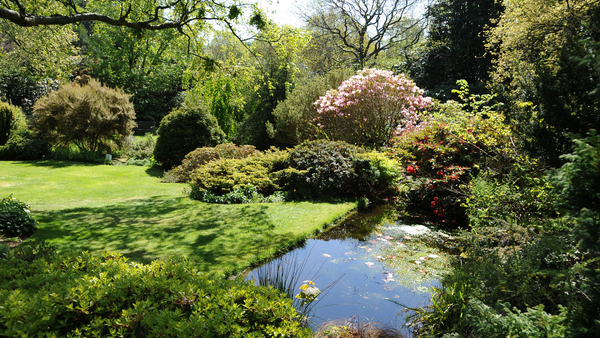
Cruickshank Botanic Garden
The Cruickshank Botanic Garden is situated on our King's College campus. It is used to support both our teaching and research; existing to promote the diversity and importance of plants and their role in the natural world.

Sir Duncan Rice Library
The University’s award winning Sir Duncan Rice Library is listed in the “Top 20 spellbinding University libraries in the World”. It contains over a million volumes, more than 300,000 e-books and 21,000 journals.
Find out more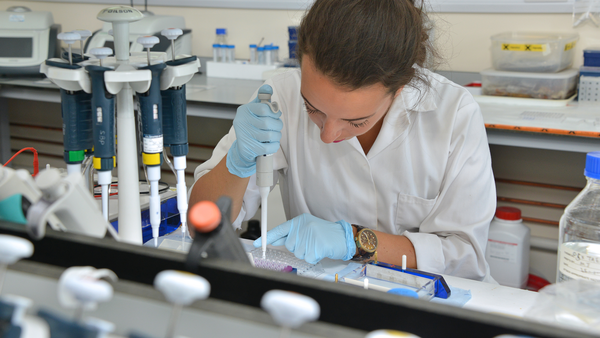
Laboratory Facilities
Our laboratory facilities include advanced analytical equipment to study soil chemical, physical and biological properties. Students have the opportunity to access state-of-the-art facilities such as mass spectroscopy, GC-MS and XRay CT imaging.
Get in Touch
Contact Details
- Address
-
Student Recruitment & Admissions
University of Aberdeen
University Office
Regent Walk
Aberdeen
AB24 3FX

